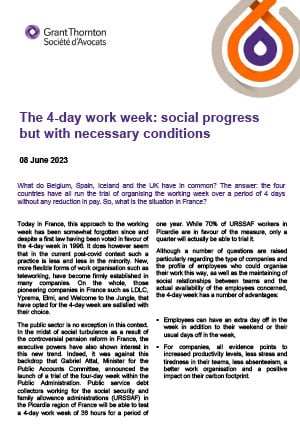
What do Belgium, Spain, Iceland and the UK have in common? The answer: the four countries have all run the trial of organising the working week over a period of 4 days without any reduction in pay. So, what is the situation in France?
Today in France, this approach to the working week has been somewhat forgotten since and despite a first law having been voted in favour of the 4-day week in 1996. It does however seem that in the current post-covid context such a practice is less and less in the minority. New, more flexible forms of work organisation such as teleworking, have become firmly established in many companies. On the whole, those pioneering companies in France such as LDLC, Yprema, Elmi, and Welcome to the Jungle, that have opted for the 4-day week are satisfied with their choice.
The public sector is no exception in this context. In the midst of social turbulence as a result of the controversial pension reform in France, the executive powers have also shown interest in this new trend. Indeed, it was against this backdrop that Gabriel Attal, Minister for the Public Accounts Committee, announced the launch of a trial of the four-day week within the Public Administration. Public service debt collectors working for the social security and family allowance administrations (URSSAF) in the Picardie region of France will be able to test a 4-day work week of 36 hours for a period of one year. While 70% of URSSAF workers in Picardie are in favour of the measure, only a quarter will actually be able to trial it.
Although a number of questions are raised particularly regarding the type of companies and the profile of employees who could organise their work this way, as well as the maintaining of social relationships between teams and the actual availability of the employees concerned, the 4-day week has a number of advantages:
- Employees can have an extra day off in the week in addition to their weekend or their usual days off in the week,
- For companies, all evidence points to increased productivity levels, less stress and tiredness in their teams, less absenteeism, a better work organisation and a positive impact on their carbon footprint.
The 4-day week could also have social and societal benefits. If white-collar workers are able to benefit from teleworking as a way of improving their working conditions, wouldn't the 4-day week also be a solution to offering blue-collar workers similar improvements in their conditions?
We understand that recent experiences in the industrial sector have shown a real willingness on the part of companies to go towards this organisation of work time, both to address CSR stakes and in the reduction of occupational risks. Faced with an ageing workforce and the difficulties in recruiting younger workers today, the 4-day week could enable companies to rethink the organisation of work through the rotation and interchanging of workers. This would equally limit to 4 days rather than 5 the risks associated with arduousness and heavy workloads and any resulting musculoskeletal disorders (MSDs). Those companies which have already trialled the 4-day work week have already seen a drop in the number of work-related accidents.
This approach does however need to be carefully thought through and adapted to the different work organisations and types involved.
Before introducing such an organization of working time, it is important that the interests and objectives are carefully considered as there are a multitude of ways in which the 4-day week can be implemented. Some companies may prefer to reduce the number of actual working hours, but this is not the case for the majority. There are also employers whose interest lies in implementing the 4-day work week only at certain times of the year. In some cases, the day not worked could be the same for all employees, while in other cases this day could differ from one employee to the next, and the day not worked could be fixed or variable, etc.
In principle, it is recommended that a 4-day working week be introduced by collective agreement so that social dialogue on the subject is encouraged. It is however, also possible for the employer to take a unilateral decision after consulting the Economic and Social Committee and informing the Labour Inspectorate. In all cases, great care must be taken to ensure that the collective bargaining agreement applicable to the company in question contains the relevant provisions.
According to the feedback of our clients, the successful implementation of this new working week requires a trial period of 3 to 6 months, renewable, as well as the existence of a joint overseeing committee with the social partners and occupational medical body and using clearly-defined indicators of workload and work organisation. Finally, such an organisation of work time implies guaranteeing access to it on a voluntary basis together with the principle of reversibility.
Employees need to be supported in the new organisation of their work which presupposes good communication on the part of the employer on the one hand, and a period of adjustment on the part of the employee on the other. The latter should give the employee the possibility to review how they can manage their timetable and adapt themselves to a potentially more intense work rhythm when it is more condensed.
In any instance, a company’s decision to operate a new way of working time must not excessively interfere with the employee's right to rest or in the respect of personal or family life. For companies that opt for a 4-day week without a reduction in actual working hours, the working day will consequently be longer, and the employer will remain bound by its health and safety obligations toward the employees.




